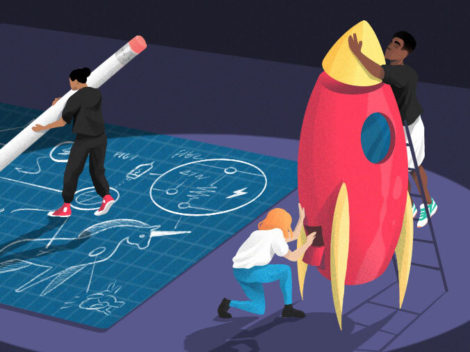So far, 2024 is shaping up as a not-so-shabby year for robotics startup funding.
Developers of workplace robots, robotic surgery technologies, and even humanoid models have all raised large rounds in the past six months. The artificial intelligence funding boom has also helped boost the space, with investors backing big deals at the intersection of AI and robotics.
Altogether, robotics startups have pulled in over $4.2 billion in seed through growth-stage financing this year, per Crunchbase data. That puts funding on track to exceed last year’s muted levels, albeit still below its cyclical peak, as illustrated below.
Workplace robots
Where’s the money going? Per Crunchbase data, workplace robotics still accounts for the largest number of rounds, with startups looking to offset the need for human labor for tasks like delivering meals, pulling weeds and moving stuff in warehouses.
Among the largest recipients in this vein is San Francisco-based Bright Machines, a developer of software and robotics technology for factory manufacturing. The company raised $106 million in Series C funding, plus $20 million in debt, in a BlackRock-led financing announced Tuesday.
Another big round went to Silicon Valley-based Collaborative Robotics, which landed a $100 million General Catalyst-led Series B this spring. Its business model centers on building “cobots” or robots that can work alongside humans doing tasks like carrying boxes and moving industrial carts.
On the agtech front, Seattle-based Carbon Robotics has harvested a total of $85 million to date, with its latest funding raised in a May Series C. Its primary offering is an AI-enabled weeding robot that provides farmers a less labor-intensive way to reduce reliance on herbicides.
Redwood City, California-based Bear Robotics, meanwhile, snagged $60 million in an LG Electronics-led financing in March. The company makes a mobile robot capable of carrying trays or packages, which it markets to customers in hospitality, assisted living, warehouse operations and other industries.
Here come the humanoids
We’re also seeing large investments in startups developing humanoid robots — a staple of science fiction that has yet to penetrate everyday reality.
Sunnyvale, California-based Figure, which describes itself as an “AI robotics company bringing a general purpose humanoid to life,” was the biggest draw here, snapping up $675 million in a February Series B. It drew heavy interest from corporate investors, with Nvidia, Microsoft and Amazon among its backers.
1X, a startup with dual headquarters in Norway and Silicon Valley, picked up $98 million in January to further development of its initial humanoid models. This includes NEO, whose human-like body is engineered with muscle-like anatomy, and EVE, a robot which resembles a human but with wheels instead of feet.
Per 1X, the humanoid robot represents the most logical form factor for integrating advanced processing and AI more deeply into the physical world. A research note on its website postulates that: “At its core, our world is designed by and for humans, which makes the human form the most effective means of interfacing with it.”
By and large, it’s still early days envisioning what these AI-powered humanoids might actually accomplish. The startup envisions them making contributions in industries including agriculture, construction and healthcare, with a particular focus on taking on dangerous and repetitive jobs.
Surgical robotics
Surgical robotics has also been a major area for robot-related startup investment over the years, and 2024 is no exception.
The biggest round went to MMI, a developer of technology for robotic-assisted microsurgical procedures that raised $110 million in a February Series C led by Fidelity. The company says its technology lets surgeons replicate movements of the human hand at the micro scale and can expand treatment options for patients needing soft tissue, open surgical procedures.
Most recently, Shanghai-based Ronovo Surgical raised $44 million in a Series B financing announced this month. The company develops a robotic-assisted system for laparoscopic surgeries.
Easy to appeal, harder to prove
Unlike many other startup sectors, founders of robotics companies usually don’t have trouble selling us on why we would want their products. After all, who wouldn’t want a robot to do jobs that are boring, backbreaking, hazardous and time-consuming for humans?
Moreover, as we face lower global population growth rates — particularly in developed economies — there won’t necessarily be enough people willing and able to do the work required to provide and maintain the level of services and infrastructure to which we’re accustomed.
The challenge is all about execution. Will today’s funded startups be capable of delivering on their visions with robotics technologies that are capable in their assigned tasks, scalable and affordable?
It’d certainly be nice to answer in the affirmative. Startup history, however, tells us that for every huge success story, there are usually many more that don’t make it.
Related Crunchbase Pro list:
Further reading:
- Collaborative Robotics Locks Up $100M, Latest Robot Startup To Raise Big
- The Week’s 10 Biggest Funding Rounds: Figure And Ascend Elements Climb To The Top
Illustration: Dom Guzman
Clarification: This story has changed since its original publication.

Stay up to date with recent funding rounds, acquisitions, and more with the Crunchbase Daily.




![Illustration of a guy watering plants with a blocked hose - Global [Dom Guzman]](https://news.crunchbase.com/wp-content/uploads/quarterly-global-3-300x168.jpg)
67.1K Followers